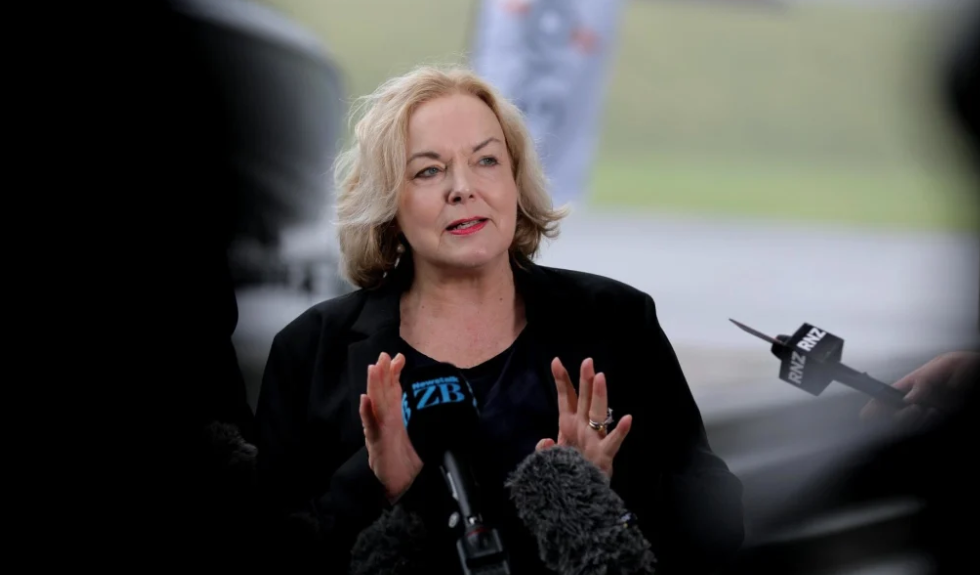
The new Defence Industry Strategy, announced today, aims to boost local defence businesses and encourage tech companies to branch out into military technology.
Collins said this would allow Defence to partner with New Zealand's advanced technology sector, but also create technology that could be exported.
"Defence is a great way through for that and if New Zealand Defence Force can help them to do that, that's really important because it's harder for our New Zealand Defence tech businesses to be able to sell into overseas markets like Australia or the UK if they don't have a New Zealand Defence Force brand on them as well."
Collins said her goal was to boost New Zealand's military strength and its weapons and tech industries in one fell swoop.
"I do think it's important that we are battle ready should we need to be."
Lethal weapons were necessary for deterrence, she believed.
"Nobody's going to be deterred by a puppet are they? They're going to be deterred by the thought that something bad could happen to them - so that's how deterrence works."
The Defence Force is signalling to its suppliers it wants more collaboration to meet the outcomes of the Defence Capability Plan.
There are about 800 suppliers in the industrial base, but the government said the new strategy would set out how the partnerships could deliver capability faster and with resilience.
The Defence Industry Strategy sets out how the Defence and the industry can work together to understand what Defence needs and when, responding to the strategic environment.
It also contains a commitment to foster more innovation in New Zealand industry and support more integration with Australia.
The strategy sets a requirement for major suppliers to develop and submit plans explaining how they will work with the New Zealand industry.
Collins said there were already some big multinational suppliers working in New Zealand which supplied to the army, navy or air force.
"They generally have plans that include a lot of work for New Zealand businesses, so because they can't do everything, they basically subcontract."
New Zealand businesses also needed to be able to be contracting into Defence, she said.
A $100 million to $300 million 'Technology Accelerator' will be set up, allowing Defence to partner with New Zealand's advanced technology sector for technology the NZDF can use, but which also has the potential to be exported.
The government unveiled the Defence Capability Plan in April, outlining $12 billion of spending over the next four years.
The plan would lift New Zealand's defence spending to more than 2% in the next eight years.
While that plan was being put together, the government worked with the industry to understand the pain-points of Defence's procurement processes, such as tender documentation and risk allocation.
"New Zealand is not immune from the increasing tensions felt throughout the world. We must build resilience in our supply chains, so we are less affected by events outside of our control," Collins said.
The situation Ukraine showed people that a country could stand up to its adversaries if it was prepared to be agile, she said.
"But you need good friends, you need great intelligence which we have and we need to make sure we maintain and keep and contribute to, but you've got to have the high tech and you've got to give your people hope because with that they will be resilient."
It was important for New Zealand to rebuild its defence capability and a lot of what the government was doing in Defence was dual use, she said.
"So whatever we're learning here can be used in the agricultural sector, used in lots of things."
Asked who New Zealand needed to defend itself from, Collins replied: "Anyone who attacks us".
"You never know who that might be, it's very important that everyone understands that you just don't know and you can't just rely on everyone else."
"The main part for New Zealand will be the small smart tech and the R&D [research and development] centre. We have the talent and the will. We now need to build the supports and clear the way for innovation."
Tauranga-based drone manufacturer SYOS Aerospace already has a R&D contract with the Defence Force.
Chief executive Sam Vye said the strategy would help build the capability of New Zealand's defence technology ecosystem to support national security and earn export dollars.
"The Technology Accelerator is a fantastic initiative for New Zealand industry that will help more companies bring advanced tech to defence faster."
Vye said the cost of uncrewed vehicles could be much lower than traditional crewed vehicles, in terms of purchase and operating costs.
"But it goes further than that as the use of robotics unlocks much greater capabilities with use of AI, computer vision and swarming capabilities. This is a capability step change."













